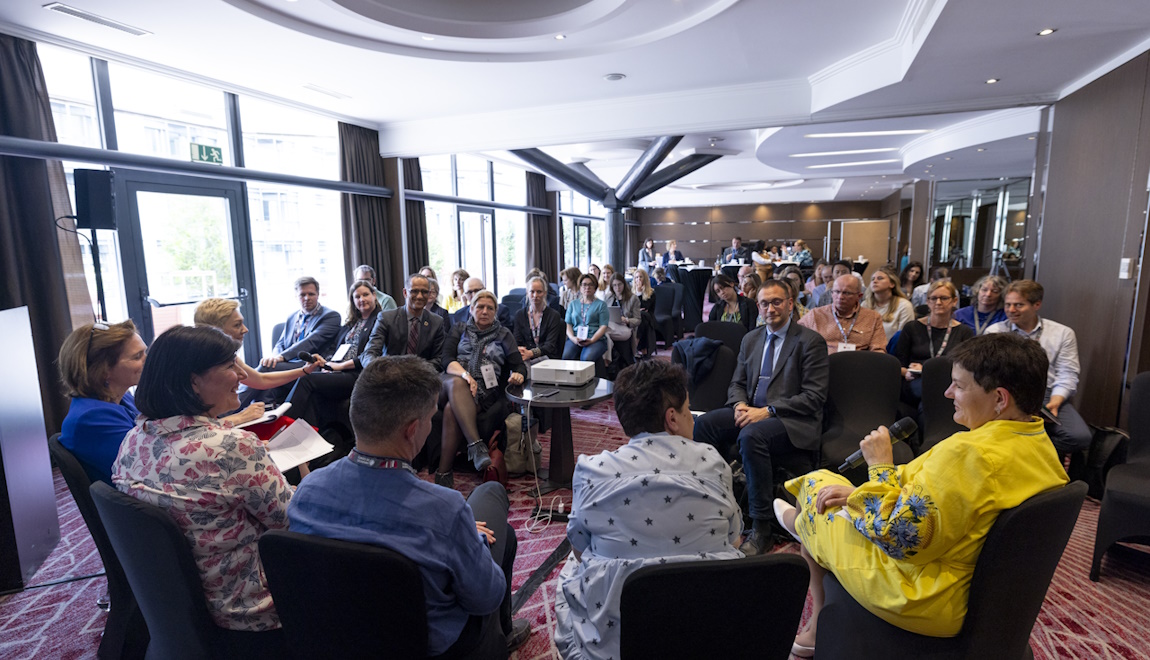NON-COMMUNICABLE DISEASE MANAGEMENT DURING CONFLICTS: LESSONS FROM UKRAINE
On May 29, the picturesque city of Geneva, Switzerland hosted a crucial symposium on the management of non-communicable diseases (NCDs) in Ukraine amidst the ongoing war. Organized by GFA in the frame of the Act4Health project supported by SDC (Swiss Agency for Development and Cooperation), the event underscored the imperative need to address health challenges exacerbated by the conflict.
The symposium was inaugurated by Mrs. Eva Schildbach, Director of the Health Department of GFA Consulting Group, setting the tone for a day of insightful discussions and strategic planning. The symposium highlighted the critical importance of investing in the control and management of non-communicable diseases (NCDs) in Ukraine.
Emphasizing the significant role of sustained and substantial investment from the Swiss Agency for Development and Cooperation (SDC), it aimed to address the challenges posed by NCDs, particularly in the context of ongoing difficulties. The event underscored the need for continuous efforts to ensure that all individuals, especially those marginalized, have access to life-saving medications and comprehensive care. This approach aligns with the Sustainable Development Goals (SDGs) and the commitment to leaving no one behind in the pursuit of health equity.
GFA’s Senior Consultant Dr. Juma Khudonazarov, said: “Strategic investment in non-communicable disease control and management in Ukraine is essential for protecting the most vulnerable, reducing healthcare costs, and improving public health outcomes. By adopting an integrated and life-course approach, Ukraine can effectively address the challenges posed by NCDs, fulfil its commitments to the Sustainable Development Goals, and build a resilient healthcare system capable of managing future health crises.”
The symposium drew a distinguished assembly of representatives from various key organizations. Notable attendees included the Ministry of Health of Ukraine, the Ukraine Public Health Centre, the European branch of the World Health Organization (WHO Europe), WHO Ukraine, the World Bank, Geneva University Hospitals, and the Geneva Health Forum. The presence of these diverse entities underscored a unified commitment to tackling the pressing health issues faced by the Ukrainian population during these tumultuous times.
In her opening address, Deputy General Director of the Ukraine Public Health Centre Olga Gvozdetska highlighted the dire impact of the war on Ukraine's healthcare infrastructure and the critical need for sustained international support. She emphasized the resilience of the Ukrainian health system and the dedication of healthcare workers who continue to serve under extraordinarily challenging conditions. Her speech resonated deeply with the audience, setting a hopeful yet urgent tone for the symposium.
One of the core discussions revolved around the strategic integration of NCD management into the broader health response during the conflict. Representatives from the Ministry of Health of Ukraine and the Ukraine Public Health Centre provided detailed accounts of the current health landscape, illustrating how the war has intensified the prevalence of NCDs such as cardiovascular diseases, diabetes, and cancer. The disruption of regular medical supplies, displacement of populations, and psychological stress were identified as significant factors aggravating the NCD burden.
The symposium concluded with a call to action, emphasizing the need for continued international collaboration and innovative approaches to healthcare delivery in conflict settings. Participants agreed on the importance of maintaining momentum in support efforts and ensuring that the Ukrainian health system remains resilient and responsive to the needs of its people.
In summary, the symposium on managing NCDs in Ukraine during the war was a significant step forward in rallying international support and expertise. The event not only highlighted the challenges but also showcased the collective resolve to overcome them, ensuring that the health of Ukrainians remains a priority even in the face of adversity.
Read more on the event here.




